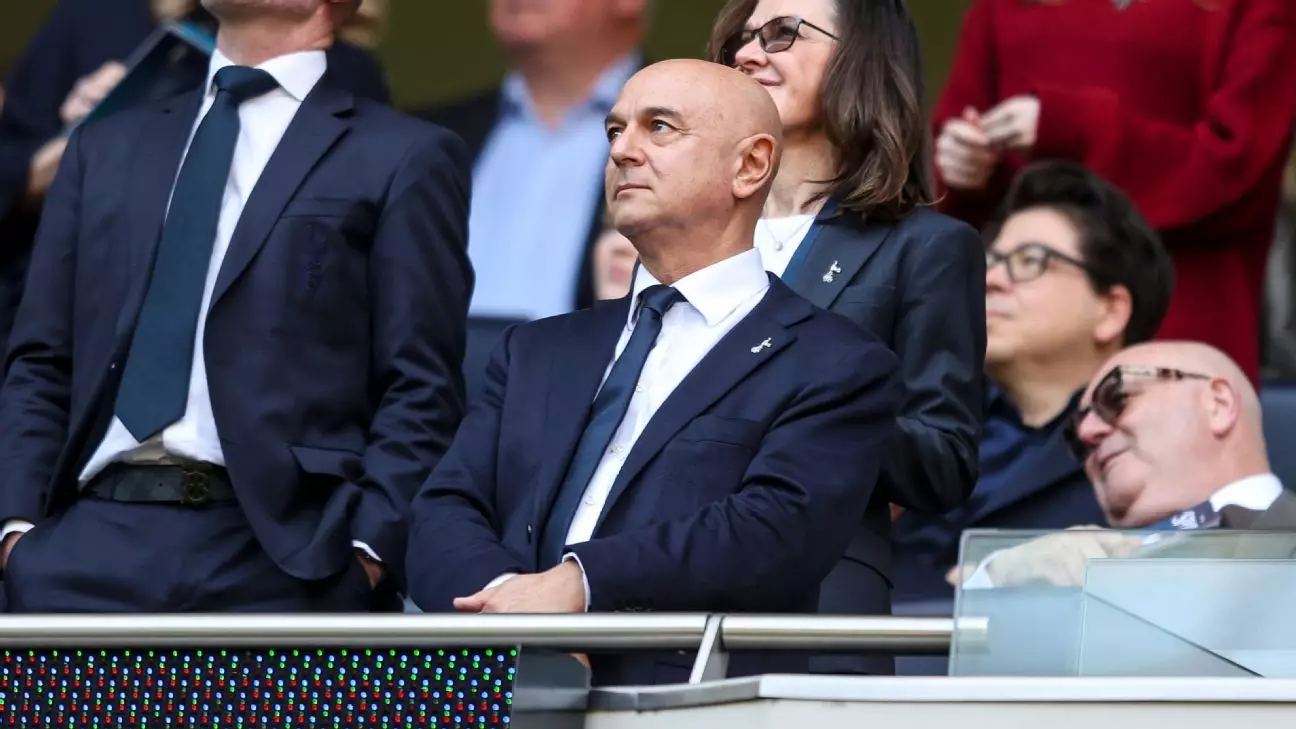Daniel Levy, the chairman of Tottenham Hotspur, finds himself at a critical juncture as he balances the club’s financial integrity with the relentless pursuit of success on the field. The recent annual financial results he presented reflect a reality that many clubs face in the current football landscape: the ramification of investments must be paired with sustainable economic practices. As Levy articulately explained in his latest statement, this season has been “highly challenging,” another acknowledgment of the mounting pressure from fans watching their team drift in the wake of rivals flourishing through aggressive spending.
Tottenham’s financial narrative highlights a complex story of ambition clashing with reality. Despite being the ninth richest club worldwide, Levy contends that increased spending cannot simply be a response to fans’ chants for more transfer activity. Instead, he underscores an economic framework aimed at long-term sustainability—a principle that, while noble, raises questions about the immediate aspirations regarding squad competitiveness.
The Fans’ Dilemma: Passion vs. Patience
Tottenham supporters are caught in a dilemma that pits their unwavering passion against a desire for immediate results. The recent protests against Levy demonstrate a growing frustration that is palpable within the fanbase. As the club oscillates between financial prudence and the desperate need for silverware—evident in their ongoing 17-year trophy drought—the fans’ patience is being tested. A season that started with so much promise now rests precariously on the club’s ability to navigate both Premier League obstacles and their Europa League campaign.
The plea for more aggressive spending in the transfer market resonates deeply among supporters yearning for glory but brushed with the cautionary tales of other clubs that have over-leveraged themselves in pursuit of success. Levy’s reminder that club spending should mirror its revenue generation reinforces the need for a strategic overhaul, especially as Spurs languish in the mid-table while their rivals thrive.
Strategic Recruitment or Missed Opportunities?
The summer transfer market saw new arrivals like Micky van de Ven, James Maddison, and Brennan Johnson, depicting an attempt to revitalize the squad. However, the glitter of new names might not gloss over the shadow of Harry Kane’s departure to Bayern Munich, a move that drained not just talent but arguably the club’s competitive edge. Levy’s defense of recruitment strategies emphasizes a need for ‘smart purchases,’ yet the line between shrewdness and missed opportunities becomes increasingly blurred when results fail to materialize on the pitch.
The figures from the club’s accounts reflect a 4% decrease in revenue, an alarming trend that runs parallel to Spurs’ on-pitch performance setbacks. With UEFA prize money plummeting dramatically due to their failure to qualify for European competitions in the prior season, one must wonder whether the club is starting to feel the economic strain that necessitates Levy’s cautious rhetoric. Will Spurs’ cautious spending overhaul yield long-term benefits, or are they gambling away immediate success in the hopes of a brighter future?
The Europa League: A Double-Edged Sword
Amid the challenges, Spurs still maintain a lifeline in the form of the UEFA Europa League. This competition serves as both an opportunity for redemption and a realization of the vulnerability the club faces. While advancing to the quarterfinals against Eintracht Frankfurt presents a chance for silverware, it also heightens the stakes for Daniel Levy and his management strategy. Winning would not only inject life into a moribund trophy cabinet but also ensure participation in the lucrative UEFA Champions League—a financial necessity in today’s football ecosystem.
However, the scars of a challenging Premier League campaign linger, as Spurs’ hopes hinge on performances that have fluctuated due to injuries and lack of form. The men’s team falters while, eerily similar, the women’s squad trails in their league, casting a shadow on overall club morale.
The disparity between footballing ambition and economic limitations raises critical questions for the board about the future direction of the club. Are they prepared to reassess their strategy if both teams fail to secure the much-needed success, which could potentially alter Levy’s reluctance to dive deeper into the market?
Toward a United Future?
The economic and competitive landscape for Tottenham Hotspur is fraught with conflicts, highlighted by Levy’s struggle to align fan expectations with financial realities. The club stands at a crossroads, where each decision may dictate its trajectory for years to come. Unlike the relentless pursuit of silverware seen at rival clubs, Spurs must ask themselves if they are who they believe they are—an ambitious club striving for excellence, or merely a provider of hopes wrapped in economic caution. What stirs within the fanbase is the audacity to hope for both stability and glory, a challenging narrative to write in the annals of Tottenham Hotspur history.

